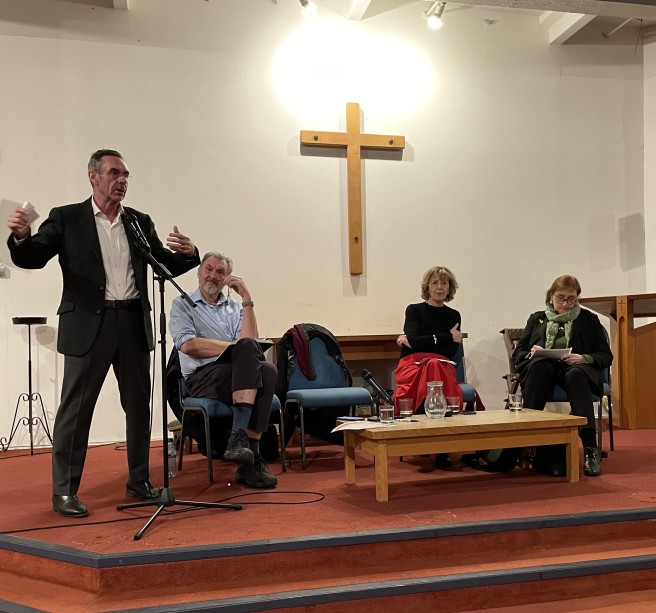The high-profile journalist and Labour campaigner Paul Mason was in Kilburn tonight, part of a debate organised by Kensal & Kilburn – Better 2024 titled “Is it worth voting Labour in 2024?”
Chaired by Melissa Benn, the panel was made up of the Kensington independent candidate, Emma Dent Coad; former General Secretary of the National Education Union, Kevin Courtney, and Mason, who confirmed he is looking to become a Labour parliamentary candidate ahead of the general election. In 2022 Mason was apparently exposed plotting to take down the British left in collaboration with security agents, something he strongly denies.
Below is a transcript of part of the Q and A session at end of tonight’s meeting in which Mason accused an audience member of antisemitism. Within minutes of the meeting concluding, Mason had tweeted his slur against the audience member, a well-known North Kensington community campaigner, to his 611,000 followers. The audio can be heard here. Judge for yourself.
Audience member: “I can’t believe that there hasn’t been any mention here of the Labour Files, like you know the way that Jeremy Corbyn was outed and obliterated through the media because of Keir Starmer and his Israeli sponsors and the fact that so many in the Labour Party are supported and funded by Israel. How can anyone even consider voting Labour, they don’t stand for the people. The only hope that we have and why I’m here supporting Emma is because she’s local she would have stood for Labour again but Starmer and his Israeli body didn’t want her standing and that’s been the case as we’ve seen across the country and it means that Labour candidates in the wards aren’t locals known to locals, don’t understand the local situation and the issues that we’ve struggled through. She knows us, she’s out there with us, she stood alongside us through the atrocity of Grenfell, she never gave up when she was our MP at the time. She held meeting after meeting after meeting in the House of Commons and has constantly supported everyone. That’s what we want, that’s our hope so as far as I’m concerned, the more independent candidates that stand the better.”
Paul Mason: “See, why didn’t you just say Jew? Why didn’t you just say Jew? Because…why didn’t you just say “He’s a Jewish agent”? Why didn’t you just say it because that’s what you mean isn’t it. And I’ll say to you, anybody in this room who wants to be part of a left where you go around saying ‘Starmer’s an Israeli agent’ if you want to do that, fine, form a party together, form an alliance, support Emma, but don’t bother supporting the Labour party because we are anti-racists, we are anti-racists and I will never accept that Starmer is an agent of Israel, comrade. If the left wants to break with Labour, if the left wants to go down a little rabbit hole of all the other five, six, seven alliances that are being formed, good luck, not as good luck as to the Greens, but good look. But please work out that that that’s where you’re heading, you have to either decide you’re for it or against it. I am against it. I am against it. I am against it and I don’t need any lectures about genocide, I’ve been to Gaza, I’ve seen what the Israelis do, I’ve seen what they do I will not have Starmer being called an Israeli agent.”
Emma Dent Coad: “I’m just going to pass by that….”
Mason interrupts: “She’s your supporter”
Dent Coad: “We’ve marched together, I know exactly where she stands, and we are marching with our Jewish brothers and sisters. I’m not having that and you know that it’s a political ideology. It’s the easiest thing in the world to accuse somebody of anti-Semitism when they are against a political ideology. It’s a political ideology which is the issue and we all know that, so, you know, don’t fall down that rabbit hole please.”

by Tom Charles @tomhcharles @urbandandyLDN










